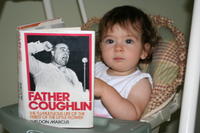The Monetary Policies of Father Coughlin and Michael Moore
 A significant cause of the great depression's persistence was recurring decreases in the money supply. This increased the real value of wages and priced many people out of their jobs. Expanding the money supply would have gone a long way to easing the depression. This was essentially the opinion of Father Coughlin, a charismatic radio star whose speeches reached thirty million people. Only decades later did this become the consensus opinion of the economics profession.
A significant cause of the great depression's persistence was recurring decreases in the money supply. This increased the real value of wages and priced many people out of their jobs. Expanding the money supply would have gone a long way to easing the depression. This was essentially the opinion of Father Coughlin, a charismatic radio star whose speeches reached thirty million people. Only decades later did this become the consensus opinion of the economics profession.1) In 1931, Father Coughlin advocated in front of the House Ways and Means Committee on the desirability of paying World War I veterans a bonus. One motivation of this was creating cheap money.
2) In 1933, he called on the government to double the value of the gold in its possession.
3) He also wished to cheapen money by instituting symmetalism, the use of gold and silver in one coin.
His possession of something resembling a coherent monetary policy seems almost accidental given his economic illiteracy. Although he struggled with the little economics that he had in school, he felt confident enough to espouse a laundry list of crazy economic views. For example, he supported the proposed Frazier-Lemke bill, which would have the federal government purchase outstanding farm mortgages by printing billions of dollars in paper money. This would seem consistent with his desire for cheap money, but he actually argued this would not be inflationary because the new money would be backed by the mortgages. Like many others during the time, he believed that the government propping up wages would ease the economy out of recession.
An amazing thing about Coughlin is that as media demagogue, he was able to convince many listeners that he was an expert in monetary policy. At least early in his career, he even convinced quite a few senators and congressman, who petitioned that Coughlin be appointed as a U.S. delegate to the London Economic Conference. Later, he lost his reputation for economic expertise, as his rhetoric degenerated to anti-semitic conspiracy theories involving Jewish communists, Jewish international bankers, and even the belief that Jewish international bankers were financing the Jewish communists.
Michael Moore is not known for his monetary policy, nor is Ann Coulter. Modern day rabble rousers rarely advise the monetary authorities. Unlike the 1930s, most people now believe that the monetary economists understand monetary economics better than the media pundits. And of course, they're right.

0 Comments:
Post a Comment
<< Home